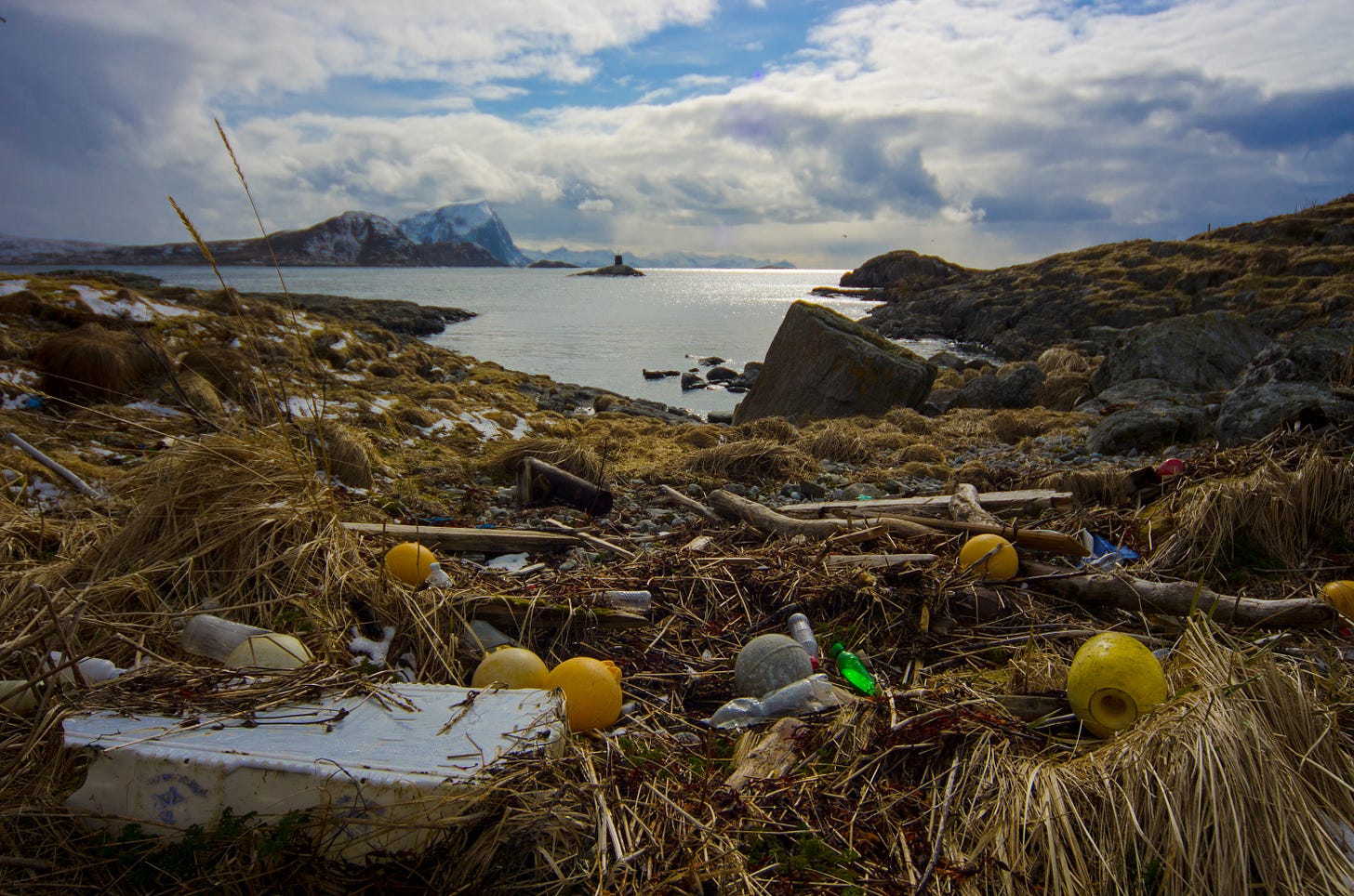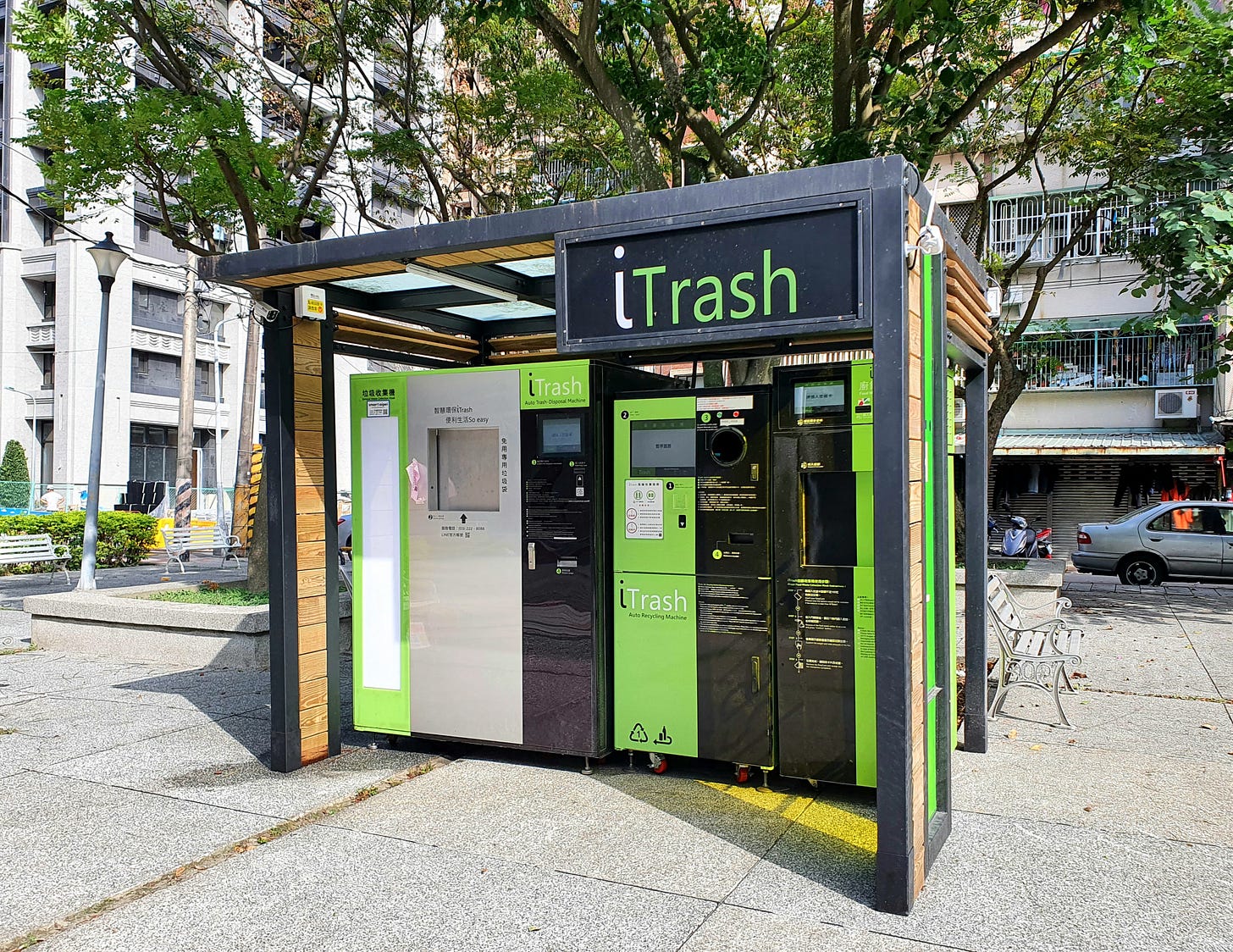Have you heard about Europe's green finance overhaul?
The SFDR points the way to mandatory sustainability reporting. Plus, lessons from Taiwan's waste revolution.
🌏 You can expect more positive climate coverage from Ours to Save over 2022, with a deeper focus on video and visuals. As always, the best way to support us is by becoming a paid subscriber. This will ensure we can keep publishing forward-thinking environmental journalism. 🌏
The SFDR: what is it?
“The future of finance is based on what happens now,” Zsuzsanna Schiff, auditing and reporting manager at the ICAEW, told our editor Florence in a recent story for Maddyness.
“Firms have an obligation to consider material ESG factors, such as climate change risks and impacts, as part of their investment processes going forward.”
The EU’s Sustainable Finance Disclosure Regulation (SFDR) is an attempt to green financial systems from the top down; it will affect most banks, insurers, asset managers and pension funds dealing in Europe – with similar reforms tipped elsewhere in the world in the coming years. These groups will now be required to report on ESG, in keeping with a set of rules and a framework for what constitutes ‘sustainable economic activity.’
The data this self-reporting provides – and the transparency it affords those deciding where to put their money – will be helpful. ‘It is a significant step in the right direction’, investment analyst Jack Spencer says, ‘There is an adage that you need to have the data to do something about it.’
You can read the full piece, which goes into some of the SFDR’s impacts and drawbacks, here.
Ending the cycle
From waste-to-energy in Taiwan to bottle schemes in Germany, we look into global solutions to the plastic waste crisis.
For many of us, the myth of recycling has become a crutch by which we justify our increasingly unsustainable and wasteful lifestyles. ‘Recyclable’ household waste includes aluminium cans, glass jars and bottles, and – by far the most notorious contender – plastic.
Plastic refers to an entire family of highly moldable synthetic materials, initially celebrated for their affordability and durability. However, it’s thanks to these characteristics that there is now an island of plastics twice the size of Texas floating in the Pacific Ocean. As plastic can only be recycled a couple of times, and water bottles alone take a staggering 450 years to decompose, this is major cause for concern.

Foreign exports and the global waste industry
To take the UK as an example region: it produces around 220M tonnes of waste a year, second only to the USA. It’s suggested that we recycle around 45% of plastic waste, but this statistic is occasionally met with scepticism. There have been reports of overburdened councils burning materials that they can no longer afford to store and transport.
A lot of Britain’s plastic waste – 688,000 tonnes, Greenpeace reports – is being shipped to countries on the other side of the world. Prior to 2018, it was absorbed into China’s scrap industry, but this market collapsed following an onslaught of media attention and public health concerns. Thailand, Vietnam and Indonesia then took its place, but could only afford to salvage a fraction of these - often unrecyclable - materials, burning the remainder in open landfills. Since these countries have begun to reject shipments, others with less stringent import regulations are now at risk: Cambodia, Senegal and Kenya to name a few.
So, how can the UK and other culprits process their own waste domestically and sustainably?
One temporary solution is through the waste-to-energy model.
Taiwan’s 3R Scheme
Formerly known as ‘the garbage island’, Taiwan’s landfills were overwhelmed following a period of rapid industrialisation between the 1960s and 1980s. However, decades on, the country is now at the forefront of global waste management efforts.
Overseen by the Environmental Protection Administration, the 3R scheme – standing for reduce, reuse, recycle – was set up in 1994 to prevent fraud and the exploitation of the system, and tackle the mountain of rubbish.
Taiwan currently operates 26 large capacity incinerators which are totally self-sufficient: the electricity required for them to run is produced by the incineration process via steam turbines. Surplus electricity has even been sold to the Taiwan Power Company.
In 2003, the island went on to adopt a ‘zero-waste policy’. The system, paid for by manufacturers, consumers and importers, reduces the pressure on the incinerators. Other measures have also been taken: colour-coded bags separate recyclable materials, and residual food waste is repurposed for fertiliser and feed for livestock.
The transformation that Taiwan has undergone provides an innovative model for other countries seeking to reduce their reliance on landfill and process their own waste.
The UK currently has four functioning incinerators, and since 2017, the Avonmouth Resource Recovery Centre has been under construction. Like Taiwan’s facilities, it will power its own Plastic Recycling and Reprocessing plants – generating enough electricity to power the equivalent of 84,000 households.
Incinerators
However, incineration brings a host of its own issues– primarily in terms of carbon emissions and air-pollution.
Due to Taiwan’s high population density on an island which is only 20% habitable, incineration has become the simplest solution to replacing landfills, which were already at two-thirds capacity. Before the incinerators were built, 30% of Taiwan’s plastic waste had entered the environment, with major ecological impacts. Throughout the 1980s, communities living amidst the makeshift rubbish dumps began to protest over the risk posed to their health.
Only 24 of the planned 36 plants were built and to avoid backlash, many of Taiwan’s incinerators supply power to integrated community centres. Ingeniously, the Taipei incinerator even heats the residents’ swimming pool.
Taiwan incinerates 97% of its unrecyclable waste. Whilst this seems like a lot, it’s also important to take into account that their ‘zero-waste policy’ is incredibly thorough. For instance, figures from 2019 reveal that Taiwan recycles 73% of its plastic and Taiwanese residents produce less than half of the plastic waste of their American counterparts.
Incineration has undoubtedly become a temporary fix for the island, supported by complex and creative recycling initiative and an aggressive zero-waste policy. Notably, since 2007, Taiwan has reduced the carbon emission from its waste incineration by almost a quarter. The country has now committed to achieving zero greenhouse gas emissions by 2050, which will be its next great hurdle.
Preventative models
However, the easiest way to prevent plastic from being illegally dumped is by preventing it from being used in the first place.
From April 2022, the UK will be introducing a plastic packaging tax: ‘set at £200 per tonne, on plastic packaging which doesn’t meet a minimum threshold of at least 30% recycled content.’
We have seen early examples of this already, through the 10p tax on single-use carrier bags in supermarkets and the reduced use of plastic cutlery and straws.
Other government incentives include an Extended Producer Responsibility scheme which will enable people to receive small cash deposits on plastic drink bottles once recycled. This model has been popular in Germany since 2002 and led to a significant uptake in recycling.
Meanwhile, the phasing out of plastic is seeing the return of ‘the milkman model’; where people either return packing to be cleaned and refilled or visit zero-waste shops.

Loop is among the companies that are bringing this model back into the mainstream, via a range of sustainable and highly durable packaging, set to replace plastic.
The firm has recently partnered with a number of household brands – from Tetley’s to Coca-Cola – and is currently on trial in a limited number of Tesco supermarkets in the East of England. It is also partnering with fast food giants Burger King and McDonalds.
CEO and founder Tom Szaky states:
"Loop was designed from the ground-up to reinvent the way we consume by learning from historic circular and sustainable models like the milkman from yesteryear while honouring the convenience afforded by our single-use consumption of today.”
Like Germany’s bottle scheme, Loop demands a small deposit paid on their packaging which is refunded upon its return through their app, drastically reducing the need for single-use plastics on household goods.
Some concerns have been raised over the scheme’s capacity to greenwash brands with negative environmental impacts. But its work with these corporations, alongside partnerships with more ethical brands, is a piece of the puzzle.
The bottom line
There’s a certain amount of wishful thinking when it comes to recycling. The very idea that our household waste can be returned and repurposed enables this faulty system to be sustained.
However, we can learn important lessons from Taiwan’s waste crisis:
Tighter control over the system can put an end to corruption and illegal dumping further along the line. The UK’s ‘throw-away’ mentality is sustained by the ignorance afforded by shipping its waste abroad. Public health concerns caused by open landfills as issues are instead footed by the world’s poorest countries. Many of which lack the public funding and infrastructure to safely dispose of it. It’s time that we take responsibility for our own waste.
The solution to this problem is for the UK - like Taiwan - to make corporations, consumers, and importers pay for their own waste disposal: it’s through holding corporations accountable for their own packaging and forcing people to reconsider their consumption habits, we can counteract the tide of plastic engulfing countries like Turkey and Cambodia.
In the meantime, it’s important not to give up on sorting, cleaning, emptying and drying your household waste; it might feel like a drop in the ocean, but it’s a valuable contribution.
Al Howard is a staff writer at Ours to Save, interested in space, art and saving the planet. You can follow her on Instagram.
Featured image courtesy of 迷惘的人生.






